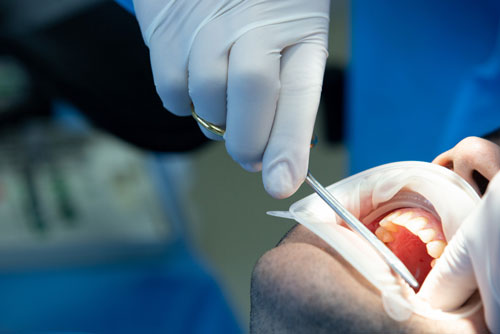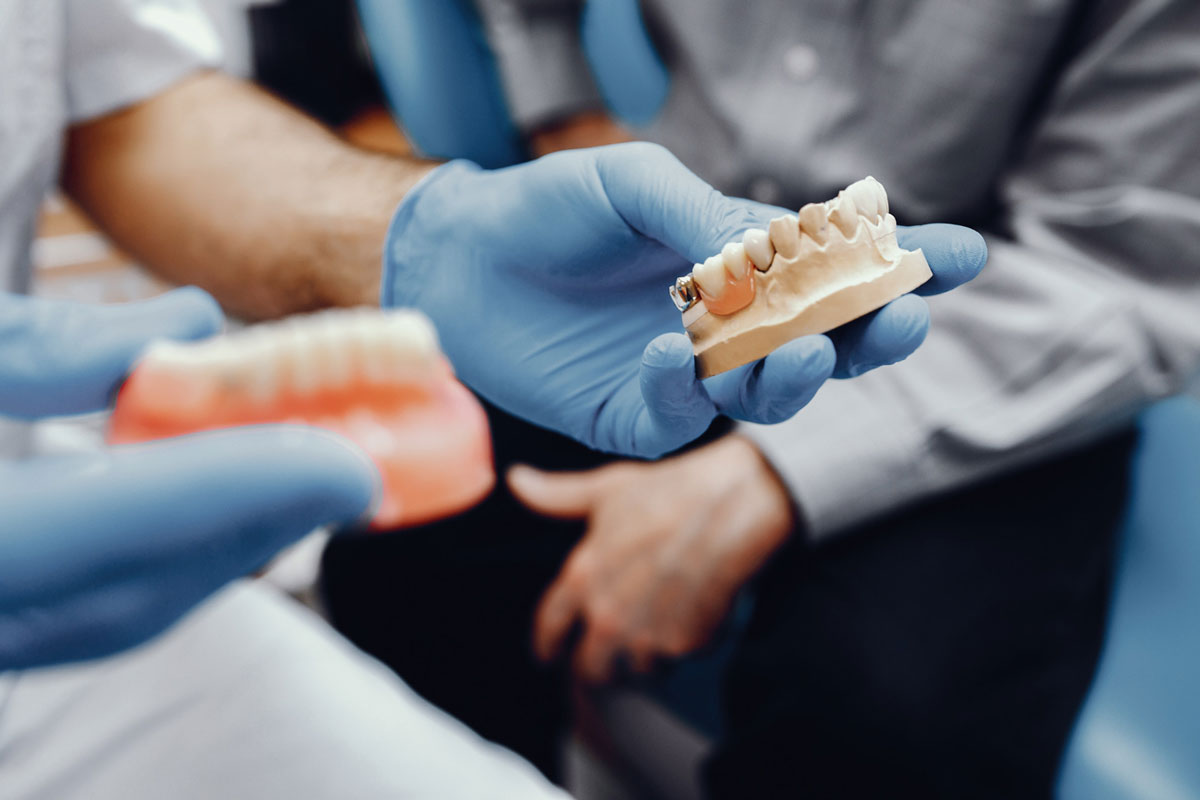Dental bridges are a popular choice when it comes to replacing missing teeth. But before committing to this dental procedure, many people wonder if dental bridges are removable or permanent. In this informative blog post, we will explore the different types of dental bridges, their benefits, and whether they can be removed or not.
What are Dental Bridges?
Dental bridges, made to resemble your natural teeth, are dental appliances used to bridge gaps caused by one or more missing teeth. Essentially, they consist of two or more crowns for the teeth on either side of the gap – these anchoring teeth are known as abutment teeth – along with false teeth or artificial teeth in between. These false teeth could be made of gold, alloys, porcelain, or a mix.
What Are the Different Types of Dental Bridges?
Dental bridges, a common solution for missing teeth, come in different varieties. So, if you’re asking, “Are dental bridges permanent or removable?” the answer depends on the type of bridge you choose. There are several types of dental bridges available, each with its unique features.
Traditional Dental Bridges
These are the most common and typically used for replacing one or more missing teeth. They involve creating a crown for the tooth or implant on either side of the missing tooth, with a pontic, or fake tooth, in between. These bridges are strong enough to replace even molars, making them a versatile choice.
Cantilever Bridges
Unlike traditional bridges, cantilever bridges are used when there are adjacent teeth on only one side of the missing tooth or teeth. The pontic is anchored to one or more neighboring teeth on one side. They require more preparation of the abutment teeth and are employed less often than other types of bridges due to their tendency to apply too much force on the other teeth and underlying bone structure.
Maryland Bonded Bridges
Also known as a resin-bonded bridge, the Maryland bridge requires minimal alteration to the existing teeth. This bridge uses a metal or porcelain framework that is bonded onto the backs of adjacent teeth to keep the bridge in place. While they are more conservative than traditional bridges, they have the inconvenience of the frame potentially inhibiting the biting surface.
Implant-Supported Bridges
Instead of being supported by crowns or frameworks, these bridges are supported by dental implants. If one implant for each missing tooth isn’t possible, the bridge may have a pontic suspended between two implant-supported crowns. These are considered the strongest and most stable type of bridge, closely mimicking the sensation of natural teeth.
Are Dental Bridges Removable?

The answer to whether dental bridges are removable or not depends on the type of bridge you choose. Traditional and cantilever bridges, for instance, are not removable once positioned by a dental professional, thus answering the query “Are dental bridges permanent or removable?” in the context of these types. They provide a permanent solution to tooth loss, effectively restoring aesthetics and function to your smile. These bridges are cemented onto the abutment teeth, which are prepared to hold the prosthetic teeth in place.
On the other hand, implant-supported bridges are indeed removable. These bridges are attached to dental implants, which are implanted into the jawbone. The bridge can be easily detached from the implants for cleaning or maintenance purposes. However, it should be noted that implant-supported bridges are designed to be a long-term solution and are meant to be worn most of the time.
Benefits of Removable Bridges
Removable bridges, such as partial dentures, offer certain advantages over fixed bridges. Some of these benefits include:
- Easy Maintenance: Removable bridges can be taken out for cleaning, which enables easy access to all parts of the appliance. This feature promotes better oral hygiene by reducing the risk of food particles getting trapped, potentially causing tooth decay and gum disease.
- Cost-Effective: Removable bridges not only provide an efficient solution for missing teeth but are also generally more affordable compared to implant-supported bridges. This cost advantage makes them a popular choice for those on a tight budget who still want to maintain a functional and good-looking set of teeth.
- Versatility: The design of removable bridges, like partial dentures, allows them to replace multiple missing teeth, extending beyond the limitations of fixed bridges. Even when the missing teeth are not adjacent to each other, a removable bridge can be designed to suit this specific need, providing an aesthetically pleasing result.
- Reversible Option: The non-permanent nature of removable bridges means they can provide a temporary solution when necessary. If there are changes in your oral health or financial circumstances, they can be easily replaced, adjusted, or removed entirely without causing significant problems.
Proper Care for Dental Bridges
Whether your dental bridge is removable or fixed, proper care is essential to ensure its longevity and maintain optimal oral health. Here are some care instructions to follow:
- Brush Regularly: Clean your dental bridge and remaining natural teeth using a soft-bristle toothbrush and fluoride toothpaste. It’s important to brush after every meal and before bedtime, paying extra attention to the areas where the bridge meets the gums to prevent potential build-up of food particles and plaque.
- Floss Diligently: In addition to brushing, use a floss threader or specialized floss designed for bridges to clean between the artificial teeth and adjacent natural teeth. This step is crucial in removing hidden food debris and combating potential bacterial build-up, contributing significantly to your overall oral health.
- Visit Your Dentist: Regular dental visits for professional cleanings and check-ups are essential to monitor the condition of your bridge and any potential issues that may arise. Your dentist can address any changes you may not have noticed and provide recommendations for maintaining the bridge’s longevity and your general oral health.
- Follow a Healthy Diet: Eating a diet that’s low in sugar and high in fiber not only promotes overall health but is also beneficial for your teeth. A balanced diet can prevent cavities and gum disease while avoiding sticky or hard foods can prevent damage to your bridge.
- Maintain Good Oral Hygiene: Keeping up with your oral hygiene routine, including brushing twice a day, flossing daily, and rinsing with an antiseptic mouthwash, promotes a clean and healthy mouth. It helps to prevent oral complications, contributes to the longevity of your bridge, and maintains a confident and beautiful smile.
Get the Smile You Deserve: Book Your Dental Appointment Now
Dental bridges can be either removable or permanent, depending on the type you choose. While traditional and cantilever bridges are fixed and offer a permanent solution, implant-supported bridges can be removed for maintenance purposes. Regardless of the type of bridge, proper care and regular dental visits are crucial to ensure their longevity and maintain optimal oral health.
Are you in search of a dental solution that best suits your needs? Consult with a dental professional who can guide you through the process and provide personalized recommendations. Don’t let tooth loss hinder your daily functions and confidence. Take the necessary steps to restore your smile and enjoy a healthy, vibrant life.
Frequently Asked Question
Are dental bridges removable or permanent?
Dental bridges can be either removable or permanent, depending on the type chosen. Traditional, cantilever, and Maryland bonded bridges are typically permanent, as they are fixed in place using dental cement or bonding techniques. However, some bridges, particularly those designed for temporary use, may be removable. It’s important to consult with your dentist to determine which option best suits your dental needs.
What are the different types of dental bridges available?
There are several types of dental bridges available, including traditional dental bridges, cantilever bridges, Maryland bonded bridges, and implant-supported bridges. Each type has its own method of support and application, with traditional bridges being the most common. These involve creating crowns for the teeth on either side of the gap. Implant-supported bridges, on the other hand, use dental implants for support and are typically more stable.
How should I care for my dental bridges?
Proper care for dental bridges involves maintaining good oral hygiene practices. This includes brushing twice daily, flossing, and using an antiseptic mouthwash to prevent plaque buildup around the bridge. Regular dental check-ups are also crucial to ensure the bridge is in good condition and to address any potential issues early on. Your dentist may provide specific cleaning tools or techniques tailored to your type of bridge.


